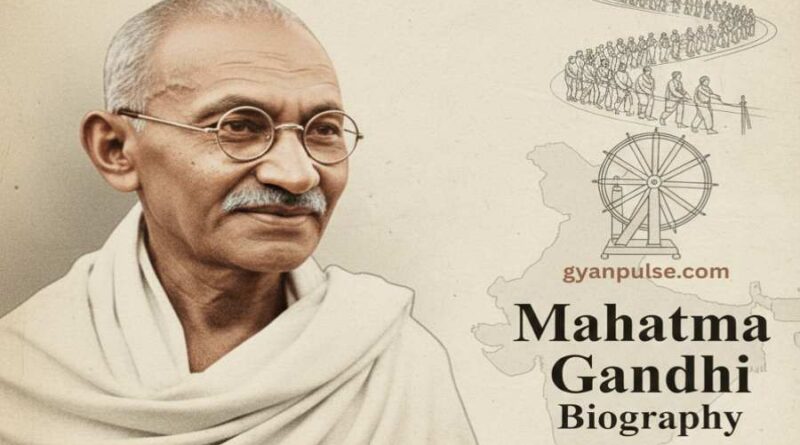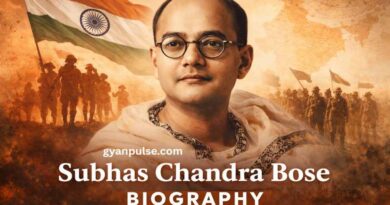Mahatma Gandhi Biography – Life, Struggles, Achievements & Legacy, Inspiring life story
Read Mahatma Gandhi Biography covering his life, freedom struggle, non-violence principles, major movements and lasting global legacy that inspires generations.
Mahatma Gandhi Biography Introduction
Mahatma Gandhi, also known as the Father of the Nation, was one of the greatest leaders in Indian and world history. His principles of non-violence (Ahimsa) and truth (Satya) transformed the Indian freedom struggle into a mass movement and inspired civil rights leaders around the globe. Born into a humble family, Gandhi‘s thoughts and actions changed the way India fought for freedom and left a lasting impact on the world.
Table of Contents
Early Life
Mahatma Gandhi was born on 2 October 1869, in Porbandar, a seaside town in today’s Gujarat, India. His full name was Mohandas Karamchand Gandhi. His father, Karamchand Gandhi, served as the chief minister (Diwan) of Porbandar, while his mother, Putlibai, was a deeply religious woman who greatly influenced Gandhi’s values and personality.
Gandhi was married at the age of 13 to Kasturba Gandhi. He later went to London in 1888 to study law at Inner Temple and became a barrister. After finishing his studies, Gandhi came back to India, and soon after, he went to South Africa to work as a lawyer.
South Africa and Birth of Satyagraha
Gandhi’s 21-year stay in South Africa (1893–1914) was a turning point in his life. He faced racial discrimination firsthand and led protests against injustice. Here, he developed the idea of Satyagraha, meaning “truth-force” – a method of nonviolent resistance. His successful campaigns against unjust laws in South Africa gave him recognition as a powerful leader.
Return to India and Freedom Struggle
Gandhi came back to India in 1915 and became a part of the Indian National Congress to help in the freedom movement. He became the face of the Indian freedom movement with his unique style of protest. His belief in self-reliance, non-violence, and mass mobilization united millions of Indians.
Key Movements Led by Gandhi:
- Champaran Movement (1917): Helped indigo farmers in Bihar fight against British exploitation.
- Kheda Satyagraha (1918): Supported peasants unable to pay taxes due to crop failure.
- Non-Cooperation Movement (1920): Gandhi encouraged Indians to stop using British goods and stay away from British schools, courts, and offices
- Salt March / Dandi March (1930): A 240-mile walk to protest British salt tax.
- Quit India Movement (1942): A call for immediate independence – “Do or Die.”
5 Important life lessons from Mahatma Gandhi
- Practice Non-Violence (Ahimsa)
True strength lies in peace, not aggression. Gandhi taught that non-violence is the most powerful weapon for change. - Live Truthfully (Satya)
Always speak and follow the truth, no matter how difficult. Honesty builds character and trust. - Be the Change You Wish to See
Don’t wait for others to act-lead by example. Personal actions can inspire greater transformation. - Simplicity is Strength
Live simply by meeting your basic needs and avoiding unnecessary desires. Gandhi believed real happiness comes from within, not material things. - Self-Discipline and Self-Reliance
Discipline and independence empower individuals. Gandhi supported Swadeshi, or self-reliance, to improve society by encouraging people to take responsibility for their own actions and needs.
Principles and Beliefs
Gandhi firmly believed in:
- Ahimsa (Non-violence): Violence is not the solution.
- Truth: Truth is God.
- Swaraj (Self-rule): Every Indian has a right to freedom.
- Sarvodaya: Welfare of all.
He also promoted cleanliness, simplicity, hand-spinning (Charkha), rural development, and communal harmony.
Role in Independence
Gandhi’s leadership united people across religion, caste, and class. Despite facing multiple imprisonments, he never resorted to violence. His peaceful protests made British rule morally untenable. India finally achieved Independence on 15th August 1947.
Death and Legacy
On 30 January 1948, Mahatma Gandhi was tragically killed in Delhi by Nathuram Godse. His death shocked the world. Yet, his ideas continue to live on. Gandhi influenced global leaders like Martin Luther King Jr., Nelson Mandela, and Barack Obama.
Global Impact and Relevance of Mahatma Gandhi Today
Mahatma Gandhi’s influence extends far beyond India’s freedom struggle and remains deeply relevant in the modern world. His philosophy of non-violence and peaceful resistance has inspired global movements for civil rights, social justice, and human dignity. In an age marked by conflict and inequality, Gandhi’s ideas encourage dialogue, moral courage, and unity. His life proves that lasting change can be achieved through truth, compassion, and collective responsibility rather than force.
Summary
Mahatma Gandhi’s life was a message of peace, sacrifice, and selfless service. His philosophy of non-violence and truth remains relevant today in times of conflict and injustice. Gandhi’s birthday, 2nd October, is celebrated as Gandhi Jayanti in India and is also recognized worldwide as the International Day of Non-Violence.
Also Check: Biography
![]()



